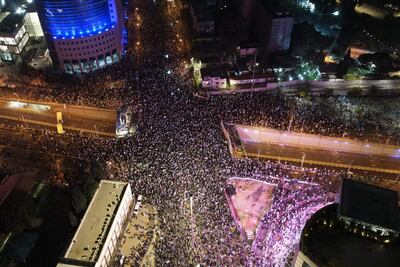Tens of thousands of protesters took to the streets of Israeli cities for the ninth straight week on Saturday to oppose the government's plan to overhaul the country's court system.
Demonstrations were largely peaceful but in Tel Aviv police released footage showing protesters breaking barriers and starting fires as they blocked roads. Police sprayed water cannon at the protesters.
Earlier in the week, protests in the city descended into violent clashes with police.
“I came to demonstrate against the regime revolution, which the Israeli government forced upon us,” history teacher Ronen Cohen said.
“I hope that this huge demonstration will effect and prove that we are not going to give up.”
The protesters oppose legislation that would limit the Supreme Court's powers to rule against the legislature and the executive, while giving parliament decisive powers in appointing judges.
Proponents say the Supreme Court needs to be reined in from overreaching into the political sphere.
Critics say the plan will weaken the courts, endanger civil liberties and harm the economy along with ties with western allies.
Tel Aviv drew the largest turnout of this week’s protests, with smaller demonstrations in several locations across the country.
Protesters waved Israeli flags and pictures depicting Prime Minister Benjamin Netanyahu as dictators such as Caesar. Other protesters waved Palestinian flags or chanted “freedom”.
Last week, senior government figures ratcheted up the rhetoric against opponents of the legislation, seeking to portray increasing disorder among demonstrators as destabilising and unpatriotic.
Limor Livnat, a former education minister for Mr Netanyahu, jokingly greeted the rally in Tel Aviv on Saturday with "hello to all the anarchists, hello to all the terrorists, hello to all the patriots".
But National Security Minister Itamar Ben-Gvir, who visited a police command centre to "exercise my policy", said: "I have no intention of apologising to anyone, certainly not to the anarchists who want to set the state of Tel Aviv on fire.”
The marches have attracted huge crowds on a weekly basis since early January, when the government first took aim at the Supreme Court.

“There's a great danger that Israel will turn into a dictatorship,” protester Ophir Kubitsky said. “We came here to demonstrate over and over again until we win.”
Israeli police had fired stun grenades and scuffles broke out in Tel Aviv on Wednesday during a nationwide “day of disruption”, raising the intensity of the protests.
The latest demonstrations come as Mr Netanyahu faces major opposition the policies of new government, the most right-wing in the country's history.
On Saturday claims emerged that the administration of US President Joe Biden considered denying entry to Finance Minister Bezalel Smotrich for a planned visit later this month, although sources have told Israeli media that such a move is unlikely.
The move follows the minister's comment that the Palestinian town of Hawara in the occupied the West Bank should be "wiped out" by the military. Two Israelis were shot dead there this week, triggering a rampage by Israeli settlers in which homes and property were set on fire and one Palestinian was killed.
On Saturday, Mr Smotrich said his comment was a "slip of the tongue in a storm of emotions".











